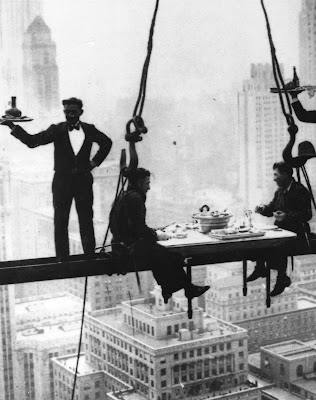How Much Should We
Work?
“How inscrutable is the civilization where men toil and work and worry their hair gray to get a living and forget to play!” —Lin Yutang1
Ever since moving
to the Bahamas in 1984, I have been intrigued by the idea of leisure—shedding
the workaholic rat race to be “free and easy” and “letting oneself go,” to
quote the German philosopher Josef Pieper. To Pieper, leisure is more than
merely getting off work at the end of the day or taking a vacation; rather “the
soul of leisure lies in celebration” of nature, life, and the divine in perfect
calm and relaxation.2
During my two-year
sojourn in the “island of June,”3 I picked up
a copy of Bertrand Russell’s celebrated book In Praise of Idleness.
Russell, author of more than 60 books, was never idle—what he really meant was
leisure time to pursue one’s own loves and goals rather than working for
someone else’s objectives. In typical contemptuous style, Russell lambasted the
Western penchant for hard labor: “The morality of work is the morality of
slaves, and the modern world has no need of slavery.” Furthermore, “The wise
use of leisure . . . is a product of civilization and education. A man who has
worked long hours all his life will be bored if he becomes suddenly idle. But
without a considerable amount of leisure a man is cut off from many of the best
things. . . . We attach too little importance to enjoyment and simple
happiness.” Russell believed that ideally man should work only four hours and
spend the rest of the time engaged in playful activities, not passive
activities like watching sports or television, but intellectual and scientific
pursuits.4
Work Ethics: The
East Versus the West
The
Judeo-Christian West has always emphasized a strong work ethic, but what about
the East? Lin Yutang, the celebrated Chinese libertarian philosopher, insisted
that the American virtues of efficiency, punctuality, and goal-setting are
actually “vices.” “From the Chinese point of view,” declared Lin, “the man who
is wisely idle is the most cultured man. . . . Those who are wise won’t be
busy, and those who are too busy can’t be wise.” Referring to Western business
practices, Lin ruminated, “Americans have now come to such a sad state that
they are booked up not only for the following day, or the following week, but
even for the following month. An appointment three weeks ahead of time is a
thing unknown in China.”5
Lin wrote his
essay on loafing in 1937. Today Lin would be aghast at the degree in which the
East has adopted the West’s working patterns, and even surpassed them. Anyone
who has been to Hong Kong, Japan, or Korea would laugh at any suggestion that
Americans are overworked.
Is Overwork an
Inherent Defect in Capitalism?
Yet that is
precisely what Harvard economist Juliet Schor claims in her bestseller, The Overworked American, first written in the early 1990s.
Critics of the market complain that the capitalist system inherently promotes
overwork and discourages leisure. According to Schor, the constant demands of
the consumer society and global competition are mandating more work hours and
exploding consumer debt. Leisure time is on the decline, she says. Eight
million Americans are holding two or more jobs, the highest figure since data
were first collected 25 years ago. Schor writes that U.S. manufacturing
employees work 320 more hours per year than their German or French
counterparts. She proposes, among other things, a government-mandated
three-week paid vacation for all U.S. employees.6
I question Schor’s
statistics. If Americans are working more and more, how does she explain the
explosion in money spent on sports and recreational activities in the United
States?
How Capitalism
Liberates Man
The critics of
capitalism misunderstand the role of the market. Only through capitalism can
savings and surplus wealth—the foundation of leisure time—be achieved.
Capitalism provides very powerful incentives to produce an abundance of
material goods in less and less time (and thus at lower costs), hence freeing
up time to pursue other interests. Greater leisure time is an inherent feature
of an advancing capitalist system. What people do with their leisure time is
another issue—some may choose to work another job, others may play. “In our
opportunity economy,” write W. Michael Cox and Richard Alm, “some
professionals, managers and entrepreneurs are putting in killer hours. But
that’s the choice they make, in return for higher pay and faster career
advancement than they might otherwise have. For the rank and file, the work
week has continued to shrink in recent decades. Average weekly hours of
production workers declined from 39.8 in 1950 to 34.5 in 2000.”7
Of course, America
hasn’t reach Bertrand Russell’s goal of 20 work hours a week. In fact, average
weekly hours have stagnated around 35 work hours over the past 20 years. Why?
One reason ignored by Schor: Higher tax rates may be encouraging employees to
work harder. A sharp cut in payroll taxes might reignite the downward trend in
work hours. Schor should put that
recommendation in her second edition.
Notes
1.
Lin Yutang, The Importance of Living (New
York: John Day, 1937), p. 148. Yutang’s classic work on leisure has been
reprinted in paperback by Quill.
2.
Josef Pieper, Leisure, The Basis of Culture (Indianapolis:
Liberty Fund, 1999 [1952]), pp. 28, 44–45.
3.
See my essay “Easy Living: My Two Years in the
Bahamas,” originally published in Liberty magazine,
December 1987, at www.mskousen.com.
4.
Bertrand Russell, In Praise of Idleness and Other
Essays (London: Unwin, 1976 [1935]), pp. 14, 22.
6.
Juliet B. Schor, The Overworked American: The
Unexpected Decline in Leisure (New York: Basic Books, 1991).
7.
W. Michael Cox and Richard Alm, “Have a Nice Day! The
American Journey to Better Working Conditions,” Federal Reserve Bank of Dallas,
Annual Report 2000, p. 23. The Dallas Fed puts out the best annual reports (go
to www.dallasfed.org).

No comments:
Post a Comment